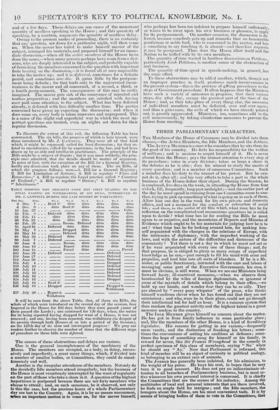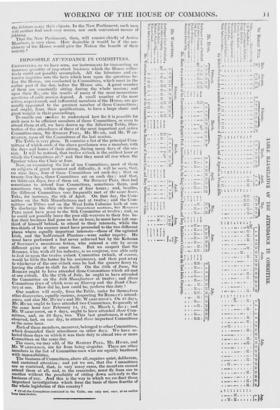THREE PARLIAMENTARY CHARACTERS.
THE Members of the House of Commons may be divided into three classes,—the Active Members, the Idle Members, and the Jobbers. The ACTIVE MEMBER iS a man who considers that he sits there for the good of his country. He feels his responsibility for the welfare
of millions ; and is anxious to acquit himself of it. He is never absent from the House; pays the utmost attention to every step of its procedure; votes in every division ; takes as large a share in the debates as he is able ; does his utmost to study the merits of every question; and is a member of numerous Committees. Such a member does his duty to the utmost of his power. But he can- not do it, after all ; and his very efforts to take a part in the whole business of the House defeat their object. During the Session, he is employed, five days in the week, in attending the House from four o'clock, till, frequently, long past midnight ;—and the earlier part of the day he must spend in running from one Committee-room to ano- ther, trying to pick up something of what is going on in each of them. Allow him one day in the week for his own private and domestic
affairs,, and not a moment for the comfort or relaxation of social life; and then, in tlic midst of all this whirl, what time has he for reflection on the complicated and momentous questions he is called
upon to decide ? what time has he for reading the Bills he must agree to or negative, and the mountains of Reports and Minutes of Evidence which ought to be his materials for judging how he is to act ? what time has he for looking around him, for making him- self acquainted with the changes in the relations of Europe, with
the intricacies of diplomacy, with the imperfect working of the laws, and with the nature of the difficulties and distresses of the community? Yet there is not a day in which he must not act as if he were acquainted with every one of these things; and, for that purpose, he is obliged to glean as many scraps of superficial knowledge as he can,—just enough to fill his mind with error and prejudice, and lead him into all sorts of blunders. If he is a Mi- nister, or public functionary, intrusted with the care and labour of managing some part of the Executive Government, his case, it must be obvious, is still worse. When we see our Ministers bring forward hasty, ill-contrived measures,—when we observe them bamboozled by the wiles of foreign diplomatists, or ignorant of some of the myriads of details which belong to their office,—we hold up our hands, and wonder how they can be so silly. They are abused by "every puny whipster" of the press, who thinks himself wondrous clever when he has found out that they are not omniscient ; and who, were he in their place, could not go through their intellectual toil for half an hour. It is a ruinous system that thus renders the greatest activity and the highest talent in a great measure useless to the country.
The. IDLE MEMBER gives himself no concern about the matter. He has got in from family influence in some particular place; and, like the members of the other House, is a kind of hereditary legislator. His reasons for getting in are various,—frequently mere vanity-, and the distinction of franking his letters ; some- times the convenience of setting his creditors at defiance; .some- times the hope of something snug for himself or his family, in reward for never, like Sir Francis Wronghead in the comedy (a perfect specimen of this class of members), saying "No" when he should say "Ay." Now that Parliament is reformed, this kind of member will be an object of curiosity in political zoology, as belonging to an extinct race of animals. The JOBBER has generally been indebted, for his admission, to the weight of his purse. He buys his seat, in hopes that he may turn it to good account. He does not pay an indiscriminate at- tention to all branches of Parliamentary business, but is most ac- tive wherever his own personal interest is concerned. It is chiefly the Committees that are the scenes of his industry. Among the multitudes of local and personal interests that are there involved, he finds an ample field for intrigue ; and the Idle members; the loungers about the House, are his most convenient tools. It is by means of bringing bodies of them to vote in the Committees; that The Jobbers carry their objects. In the New Parliament, such men will neither find such easy access, nor such convenient means of jobbing. That the New Parliament, then, will consist chiefly of Active Members, is very clear. How desirable it would be if the ma- chinery of the House would give the Nation the benefit of their activity !



















































 Previous page
Previous page